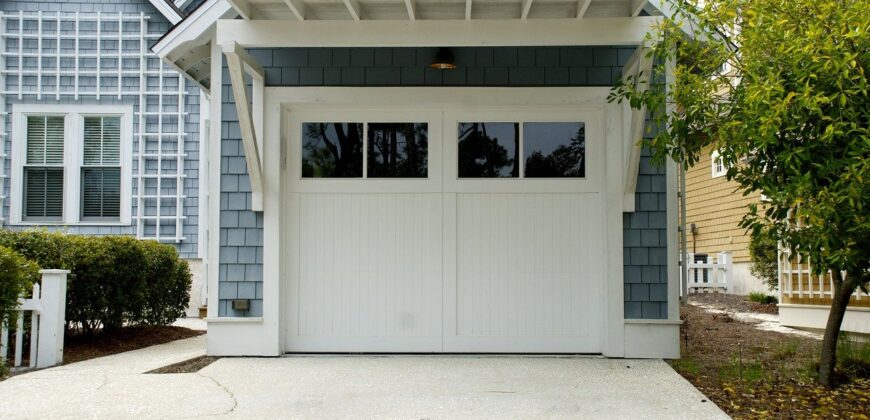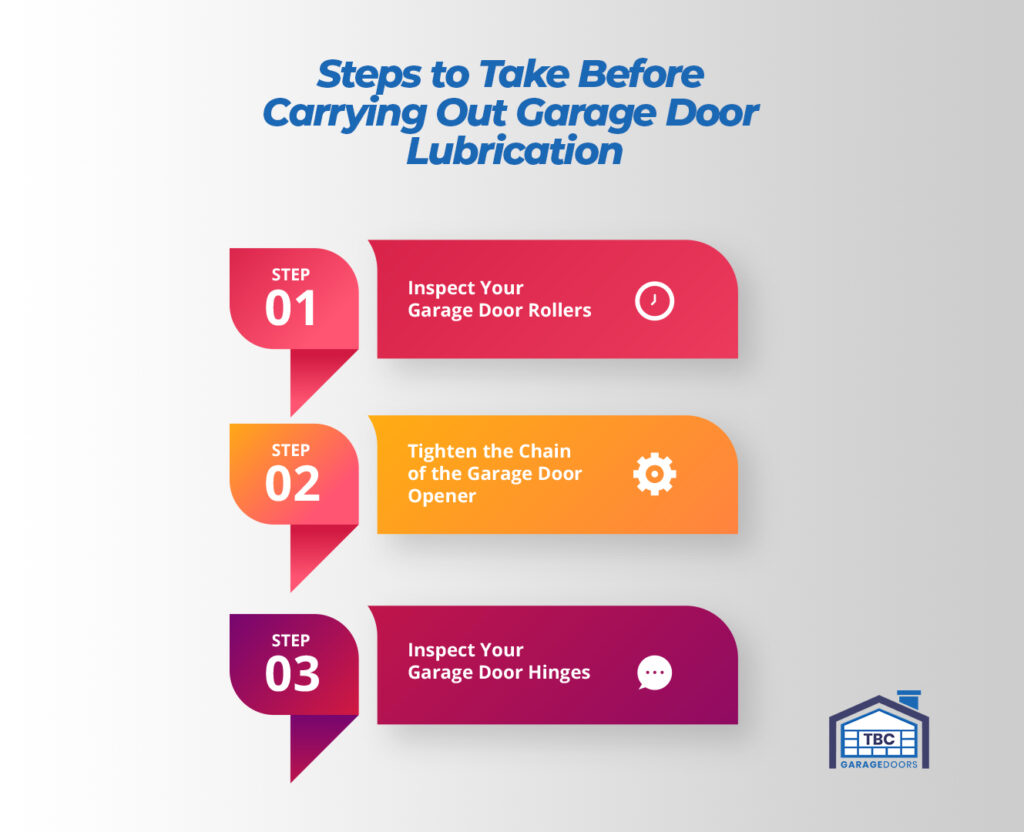How To Choose a Good Lubricant for Your Garage Door
Garage doors come in different shapes, sizes, and materials. All of them, however, share the need for maintenance, especially lubrication. Garage door lubrication is also called oiling or greasing. It involves the application of a lubricant on the active parts of a garage door. These are the hinges, rollers, and springs. These parts are the move up against one another each time you open or close the door.
This movement becomes less smooth due to friction and frequent use. So, when you apply a lubricant, it is easier to glide these parts over each other each time the door moves.
It is essential to mention that although lubricating is also called greasing or oiling, you will not be applying oil. So, for example, you should not use engine oil or cooking oil to lubricate your garage door.
Generally, oil goes a long way in reducing friction and helping stuck motor parts move along smoothly. However, garage doors do not require thick layers of lubrication. So, applying regular oil or grease may be counterproductive. This also applies to lubricants that are thick or runny.
Lubricants that are too thick will take a while to dry up. While it lasts on the surface of the metal or any part of the door, it could accumulate particles. These particles can clog the hinges or the rollers of your garage door. This will increase friction, make your door noisy, and may even corrode the metal. Thus, you will have more trouble getting your garage door to work.
What Are the Types of Garage Door Lubricant?

Lubricants that are made for garage doors are often either silicone-based or lithium grease. Both of these options work great for both residential and commercial garage doors. So, how do you know the best one for your garage door?
Here is some further explanation of both types of garage door grease.
Silicone
Silicone lubes are designed with more temperature and moisture resistance. This means that when the weather comes extremely hot or cold, it can still serve the purpose of lubricating your garage door. So, if the temperature in your area is harsh, a silicone lubricant is a good choice.
The texture of silicone lubricants is relatively light compared to lithium grease. As a result, it can quickly spread to areas hard to reach when cleaning or performing simple maintenance. For instance, it would be easier to spray on a silicone lube on your garage door spring than to apply it directly on the spring.
Lubricants in this category may not prevent friction as much as lithium grease lubricants. This is because the spray lets out a thin layer. Therefore, it will not be sufficient to ease over the moving parts of a door. However, the same thinness allows it to spread evenly, thus covering all the essential elements.
Unfortunately, this lubricant may not be suitable for doors that have rubber parts. The lube can soak into them and eat away at them or cause damage. If you opt for a silicone lubricant, you must be careful to spray as close to the metal as possible. Most cans come with nozzles that help users direct the lube in the needed corners.
Lithium grease
Lithium grease, or white lithium grease, is a durable product for reducing friction. This lubricant usually remains on the surface when applied. It serves as a coating that helps metal parts glide smoothly. So, that squeaky noise your garage door makes will stop.
Unlike silicone lubricants, white lithium grease can gradually wear off. Primarily if you use your garage entry often. This means that you may have to reapply the coating more often than apply a silicone-based lubricant. Despite this, white lithium grease is appropriate for heavy-duty or commercial garage doors or any doors with high traffic.
Sadly, it is not waterproof. Thus, it is not suitable for warmer climates. It would be better to use a silicone lubricant to preserve your garage door for as long as possible. It holds up well in cold weather and does not freeze. It is available in spray cans for easy use.
How To Choose the Correct Lubricant
These are things to consider when choosing a brand or type of lubricant.
1. Why Do You Need the Lubricant?
Lubricants serve quite many purposes. Some are:
● To reduce friction and wear
Friction happens when metal pieces move too closely together. It often generates heat and noise. This is why garage doors make a grating or squeaky noise after a while. Once you apply lubricants, the friction will be reduced.
● To protect the metal from rusting
Lubricants can absorb or transfer heat to metal. In this case, garage doors need lubes that can keep heat away from them. This is because heat (or moisture) and oxygen are often responsible for rust. When rust starts to appear, it damages the quality of a garage door.
Although most lubricants can reduce friction, not all of them can protect your garage door from rust or corrosion. So, you should look out for lubes that offer both options.
2. Check for Specifications
Often, garage door manufacturers specify or recommend specific lubricants to be used on the door. It may seem rather obvious, but most people over such recommendations. While you might be tempted to use the old lubricant that worked for your former garage doors, it’s not a great idea. Grease can cause damage to doors if misused.
For instance, some lubricants have harsh components. These are better suited for heavy-duty doors than residential garage doors. In addition, potent greases can eat through the rubber. If you decide to use a random lubricant, it could be potentially harmful to the lifespan of your garage door.
On the other hand, heavy-duty garage doors need an adequate level of lubrication to keep functioning. These are usually found in warehouses or commercial buildings. If you use substandard lubrication, it won’t do much to help the door.
Some lubricants also have labels that let you know if they will be suitable for particular garage doors or not.
Of course, you could consult a garage door specialist instead. They can recommend or suggest a good lubricant for you. This will save you time and the risk of any potential errors.
3. Ensure that it is multi-functional
Lubricants perform quite many functions. Now, you may find a lube that does one or more of these, while others are only capable of one. For instance, some lubes have anti-rust qualities. So, they can shield your garage entry from rust as well as keeping friction away.
It would benefit your garage door if you went with a lubricant that performs multiple tasks. This may, you can get several things covered while lubricating your door. If you use a waterproof lube, aids lubrication and prevents corrosion, your maintenance will be more effective. Your entry will remain durable and sturdy for a longer time.
4. Choose lubricants that are easy to use
Any lubricant you select must be easy to use. Otherwise, it may cause further problems. Most of the best lubes are sprays. Some of them come with smaller nozzles so that you can spray the lube directly without wasting any of it. Also, it will be easier to get it into the areas you cannot see correctly.
In addition, easy spray bottles prevent you from over spraying. So, the sprayed areas will dry out quickly without creating a mess on your garage door.
5. Temperature or weather
Silicone-based lubricants hold up better in warm weather than white lithium grease. So, if you live in an area where the temperature is harsh or hot, it would be better to buy a silicone-based lube. Choosing lithium grease means that you would have to reapply the grease often. It also means that you will be using more lubricant than is necessary.
So, before you choose a brand, compare your weather with the types of lubricants on the shelf. This will help you make a convenient and cost-efficient decision.
6. Is is affordable and available?
No matter how effective it is, a lubricant is no good to you if it is unavailable or if you cannot afford it. However, suitable lubricants are not necessarily expensive. In fact, some brands offer spray lubricants for under ten dollars.
So, while you are shopping for a lubricant, don’t rush towards the high-end products.
Consider the temperature or weather
Silicone-based lubricants hold up better in warm weather than white lithium grease. So, if you live in an area where the temperature is harsh, it would be better to buy a silicone-based lube.
Choosing lithium grease means that you would have to reapply the grease often. It also means that you will be using more lubricant than is necessary.
So, before you choose a brand, compare your weather with the types of lubricants on the shelf. This will help you make a convenient and cost-efficient decision.
Conclusion
Whether iron or wooden, all garage doors need to have their moving parts lubricated from time to time. It is best to schedule routine checks with garage door specialists. You can also leave your yearly lubrication in their hands. At TBC Garage Doors, you will have experts ready to provide installations, repairs, or maintenance for your garage door. Contact them here.




Recent Comments